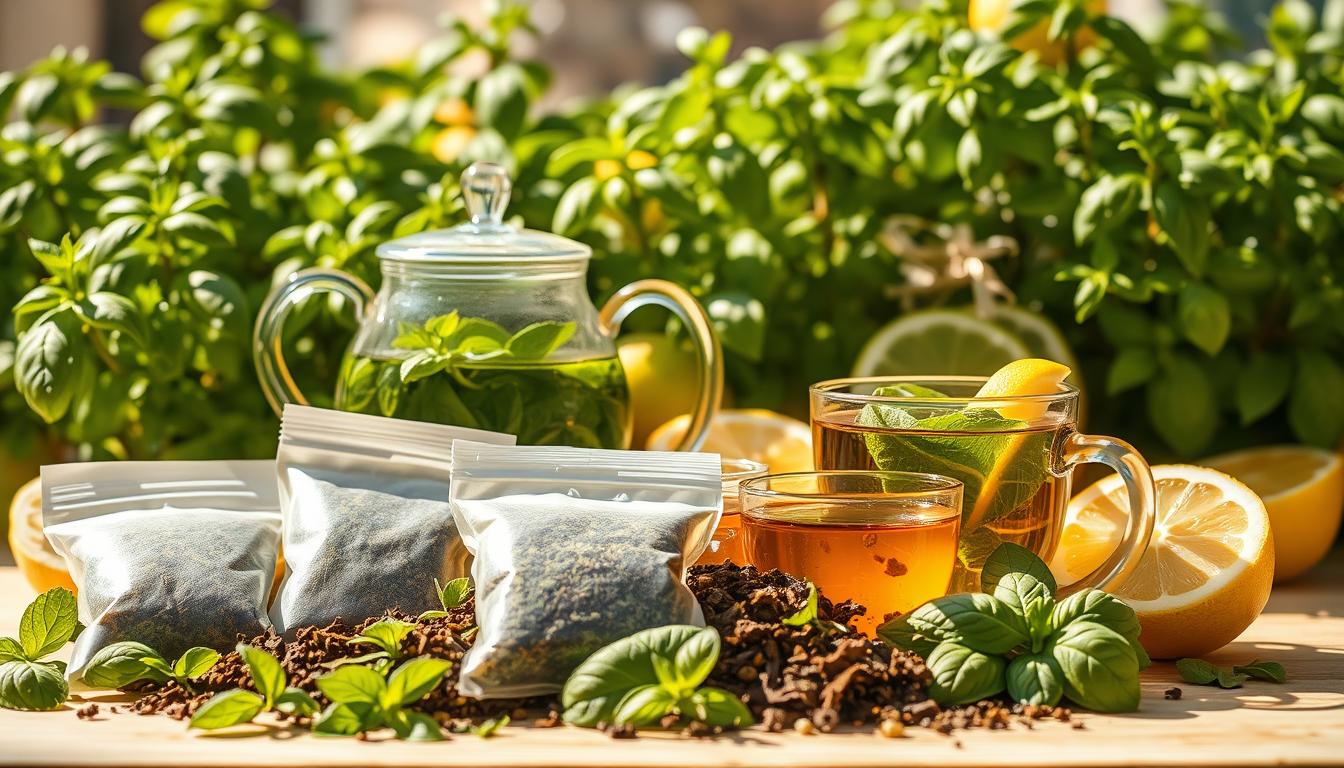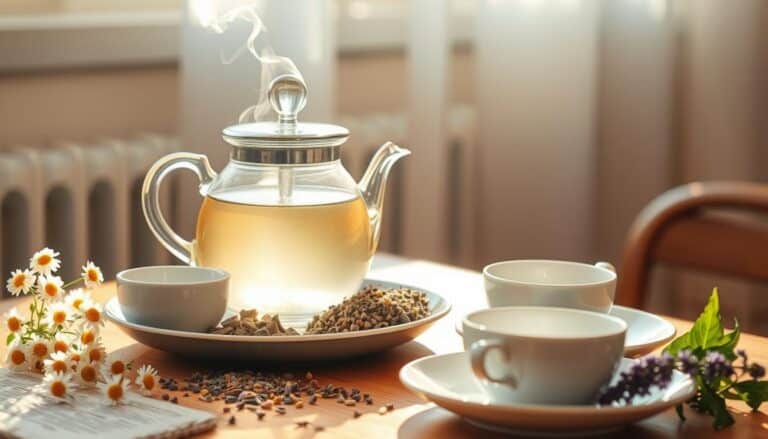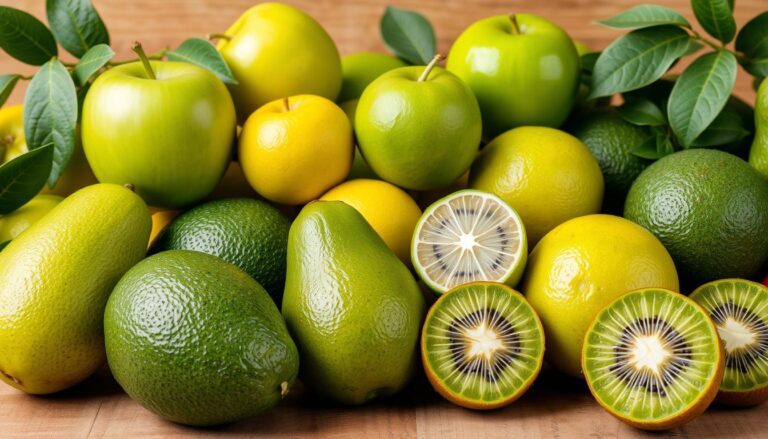Basil Tea Recipes: 6 Soothing Ways To Enjoy It
Explore the world of basil tea, a refreshing drink that turns a simple herb into something special. Start your journey with six amazing basil tea recipes. They will excite your taste buds and boost your health.
Basil tea is more than just a drink. It’s full of nutrients like antioxidants, vitamins K and A, iron, and calcium. It’s perfect for a relaxing evening or a morning boost, offering great health benefits.
Basil tea helps with inflammation and supports your digestive health. Every sip brings you closer to natural wellness, a tradition in medicine for centuries.
Key Takeaways
- Basil tea provides multiple health benefits
- Can be enjoyed hot or cold
- Rich in essential nutrients
- Easy to prepare at home
- Supports overall wellness naturally
- Versatile drink with various preparation methods
Understanding the Magic of Basil Tea
Basil tea is a journey into natural wellness. It combines old traditions with new health insights. This drink is more than a beverage; it’s a holistic experience that connects you to ancient healing practices and botanical wisdom.
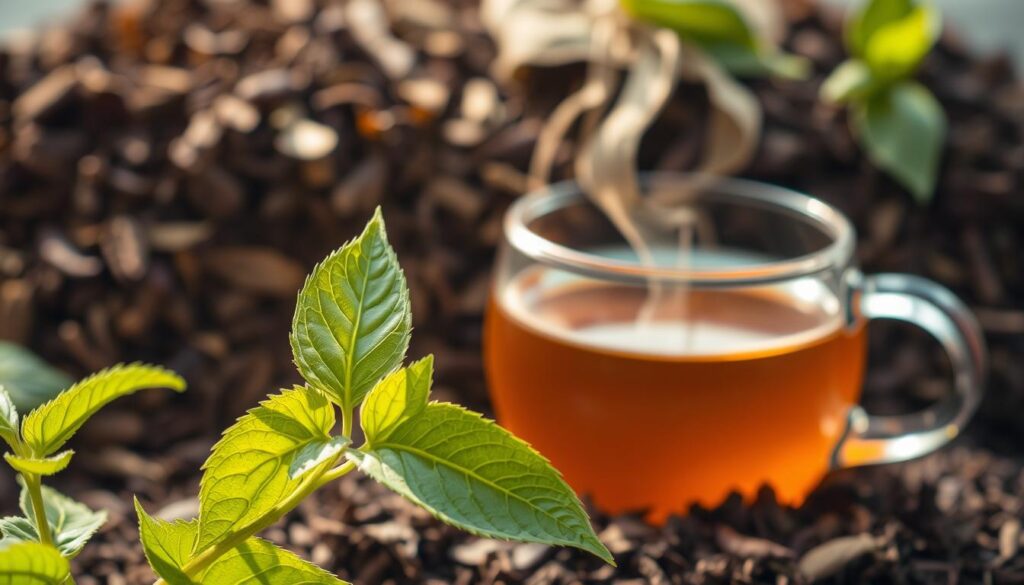
Tulsi tea, or holy basil tea, is a powerful herbal remedy. It comes from India and is known for its health-supporting properties.
Types of Basil for Tea Making
There are many basil tea varieties, each with its own unique characteristics:
- Sweet Basil (Ocimum basilicum)
- Holy Basil/Tulsi (Ocimum sanctum)
- Lemon Basil
- Thai Basil
Health Properties and Benefits
Holy basil tea does more than just quench your thirst. It helps your body manage stress, boosts your immune system, and offers antioxidant protection. Drinking tulsi tea regularly may:
- Reduce chronic stress
- Support cardiovascular health
- Enhance mental clarity
- Promote natural detoxification
Cultural Significance and Traditional Uses
In Ayurvedic medicine, holy basil is a sacred plant. It symbolizes spiritual purification. Tulsi tea is more than a drink; it’s a holistic approach to wellness that links physical health with spiritual balance.
If you’re looking for stress relief or natural health solutions, basil tea is a tasty and meaningful way to support your well-being.
Essential Equipment for Making Basil Tea
Making the perfect herbal tea needs more than just good ingredients. The right tools can make your basil tea stand out. Choosing the right equipment helps you get the most flavor and health benefits from your basil.
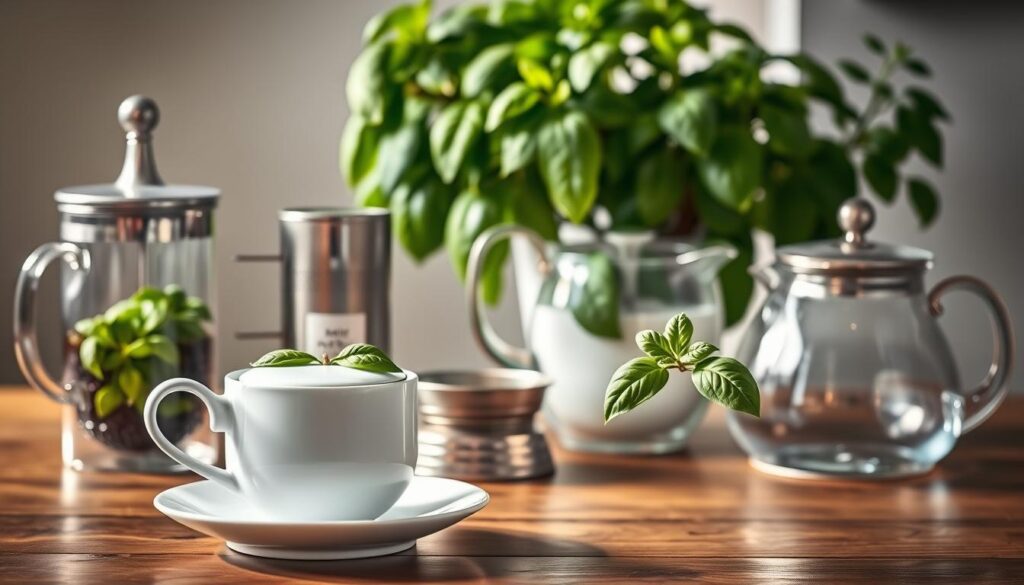
- Glass Teapot with Built-in Strainer: Great for loose-leaf brewing, letting you control the amount of herbs
- Ceramic Tea Infuser: Keeps heat well and brews evenly
- Stainless Steel Mesh Strainer: Good for catching small herb particles
- Electric Kettle: Keeps water at a consistent temperature
How you brew your basil tea depends on whether you use fresh or dried leaves. Each needs different equipment to get the best flavor and health benefits.
| Equipment Type | Best For | Brewing Efficiency |
|---|---|---|
| Glass Teapot | Loose Leaf Basil | High |
| Ceramic Infuser | Fresh Basil Leaves | Medium-High |
| Stainless Steel Strainer | Dried Basil Herbs | Medium |
Invest in good herbal tea infusions equipment to enhance your basil tea experience. The right tools not only improve taste but also keep the delicate aromas and health benefits of your tea.
Basic Fresh Basil Tea Recipe
Making basil leaf tea at home is simple. It turns fresh basil into a soothing drink. This tea can brighten your day and offer health benefits.
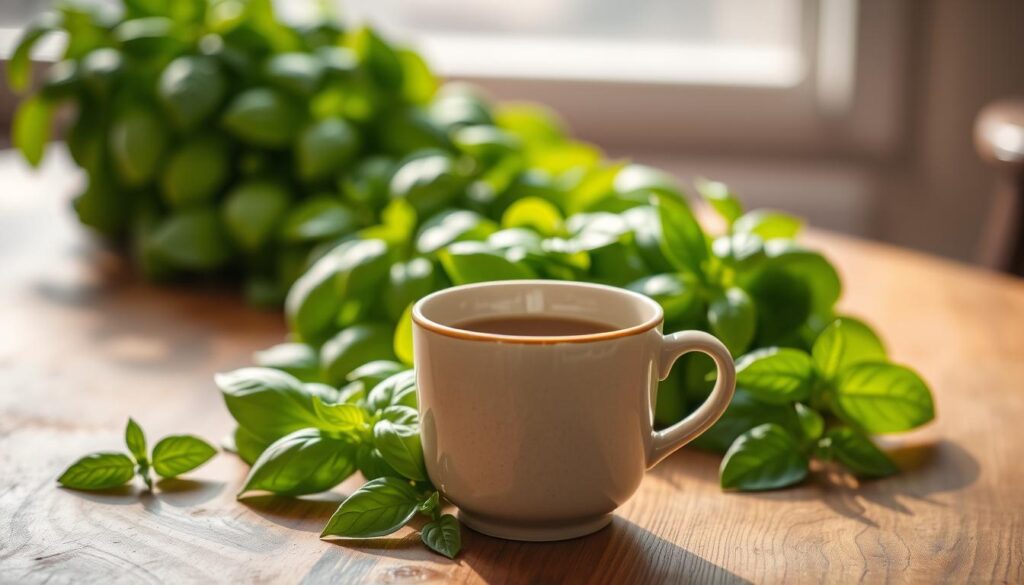
Basil leaf tea is a versatile drink. It captures the essence of the herb. Whether you want to relax or boost your health, this recipe will help you make the perfect cup.
Ingredients and Measurements
- 6-8 fresh basil leaves
- 8 ounces of filtered water
- Optional: 1 teaspoon honey
- Optional: Lemon slice for garnish
Preparation Guide
- Gently wash the fresh basil leaves
- Bring water to a rolling boil
- Place basil leaves in a tea mug
- Pour boiling water over the leaves
- Steep for 3-5 minutes
- Strain leaves (optional)
- Add honey if desired
Storage and Freshness
| Storage Method | Duration | Best Practices |
|---|---|---|
| Room Temperature | 4-6 hours | Keep away from direct sunlight |
| Refrigerated | 24-48 hours | Store in airtight container |
| Fresh Leaves | 5-7 days | Keep in sealed bag in refrigerator |
Pro tip: For the most vibrant basil leaf tea, use fresh leaves and consume within 24 hours of brewing.
Holy Basil (Tulsi) Tea Preparation
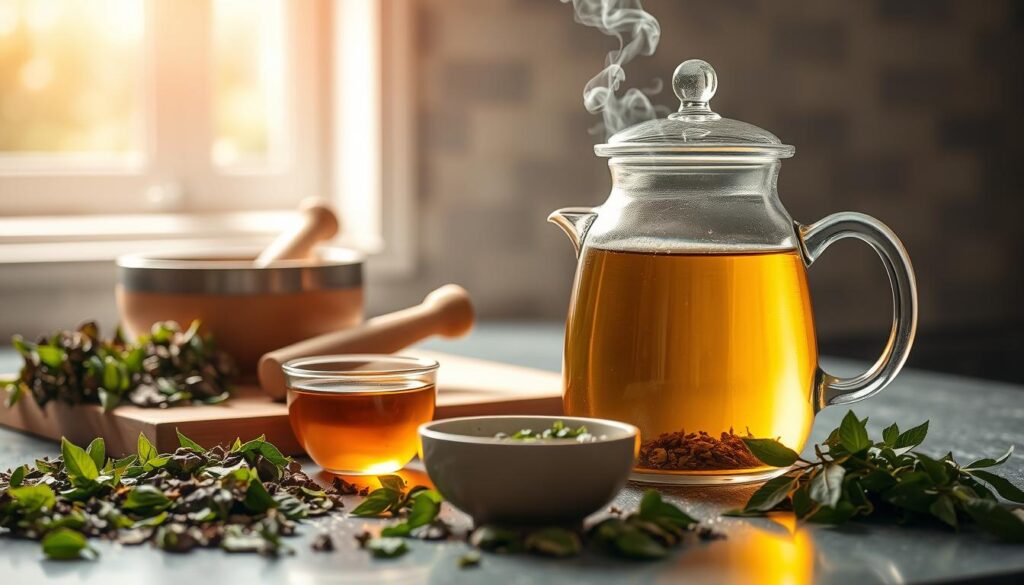
Discover the ancient wellness secret of tulsi tea. It’s a powerful organic basil tea cherished in Ayurvedic medicine for centuries. This sacred herb, also known as holy basil, offers a unique blend of healing properties.
Tulsi tea has a distinctive flavor and remarkable health benefits. When preparing this organic basil tea, pay attention to several key details. This will help you maximize its potential.
Essential Steps for Perfect Tulsi Tea
- Select high-quality organic tulsi leaves
- Use fresh, filtered water
- Heat water to just below boiling (around 195-205°F)
- Steep leaves for 5-7 minutes
Your brewing method can significantly impact the tea’s flavor and benefits. Fresh or dried tulsi leaves both work well. Many tea enthusiasts prefer fresh organic basil tea leaves for a more vibrant taste.
| Tulsi Tea Type | Steeping Time | Recommended Benefits |
|---|---|---|
| Fresh Tulsi Leaves | 5-6 minutes | Stress reduction, immune support |
| Dried Tulsi Leaves | 6-7 minutes | Adaptogenic properties, mental clarity |
Pro tip: To enhance your tulsi tea experience, try adding a touch of honey or a slice of lemon. These natural sweeteners can complement the herb’s complex flavor. They also provide additional health benefits.
Basil Tea with Honey and Lemon
Make your basil tea recipe special with natural sweeteners and citrus. It’s easy to turn a simple herbal drink into a delightful wellness treat. Honey and lemon not only make basil tea taste better but also add to its health benefits.
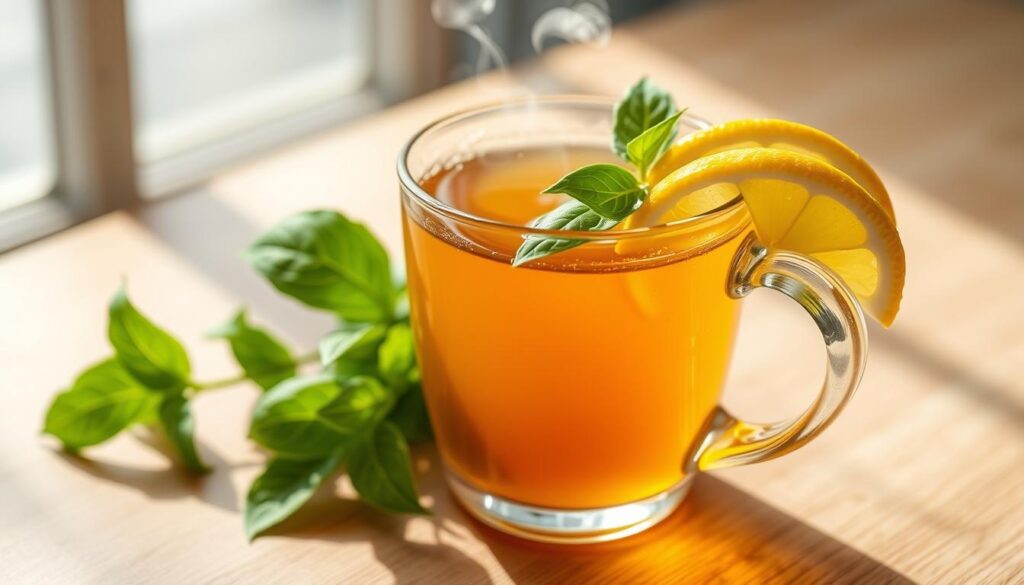
Flavor Enhancement Techniques
Here are simple ways to boost your basil tea’s flavor:
- Choose raw, local honey for the best nutrition
- Go for fresh, organic lemons for a zesty taste
- Try different honey types like wildflower or clover
- Use freshly squeezed lemon juice for the best flavor
Serving Suggestions
Here’s how to serve your basil tea to perfection:
| Serving Style | Benefits |
|---|---|
| Hot Tea | Sothes sore throats, relaxes before bed |
| Iced Tea | Refreshing in summer, keeps you hydrated |
| Morning Wellness Drink | Boosts immune system, gives gentle energy |
Pro tip: Add honey to your basil tea when it’s slightly cooled. This helps keep its natural enzymes. Enjoy your basil tea as a comforting ritual that cares for your body and soul.
Iced Basil Tea for Summer Refreshment
Beat the summer heat with a cool and invigorating basil tea. It will change how you stay hydrated. Iced basil tea is a refreshing twist on hot drinks, perfect for hot days.
To make the best basil tea, start with a few simple steps. First, brew a strong basil tea that won’t lose flavor when ice melts. Use fresh basil leaves and steep them a bit longer than for hot tea.
Ingredients for Perfect Iced Basil Tea
- Fresh basil leaves (6-8 leaves per cup)
- Filtered water
- Optional: Honey or natural sweetener
- Ice cubes
You can add exciting flavors to your iced basil tea. Try these mix-ins to make your summer drink even better:
| Flavor Enhancer | Pairing Suggestions |
|---|---|
| Cucumber | Adds a crisp, cooling element |
| Mint Leaves | Provides extra refreshing notes |
| Lemon Slices | Brings bright, citrusy undertones |
Pro tip: Make your basil tea a bit stronger when you’re going to ice it. As the ice melts, it will dilute the drink, keeping the flavor just right. Chill your tea fast by using frozen basil leaf ice cubes for a stronger aroma.
Iced basil tea is not only tasty but also a healthier choice for summer. It’s full of antioxidants and might help reduce stress. This drink is both refreshing and good for you.
Basil Tea Blends with Other Herbs
Exploring herbal tea infusions opens a world of flavors and health benefits. Basil is a great base for unique tea blends. It can change how you enjoy drinking tea.
Creating herbal tea with basil brings exciting flavors and health perks. Some herb mixes can make your tea even better:
- Mint and Basil: A cool and refreshing mix that helps with digestion
- Chamomile and Basil: Helps you relax and lowers stress
- Lemon Balm and Basil: Improves mood and brain function
Complementary Herb Combinations
Creating good herbal tea blends means knowing each herb’s special traits. Basil goes well with herbs that share its health benefits or taste well together.
Seasonal Blend Recommendations
Herbal tea blends can match the seasons. In winter, try warm mixes with ginger and cinnamon. For summer, choose light blends with lavender or rosemary for cool drinks.
- Winter Blend: Basil, Ginger, Cinnamon
- Summer Blend: Basil, Lavender, Mint
Try out different herbal tea blends to find your favorite. Start with small batches and see what works best for you!
Growing and Harvesting Basil for Tea
Starting your own organic basil tea garden is exciting. It begins with knowing how to grow basil. This herb does well indoors and outdoors, perfect for those who love fresh tea.
First, pick a spot that gets lots of sunlight and has good drainage. Basil needs 6-8 hours of direct sun each day. You can grow it in pots or in the ground. Make sure the soil is full of organic stuff.
- Choose high-quality organic basil seeds
- Use nutrient-rich potting soil
- Maintain consistent moisture
- Protect from extreme temperatures
There are many basil types for your tea. Sweet basil, Thai basil, and holy basil (Tulsi) each have their own taste and health perks.
| Basil Variety | Flavor Profile | Tea Suitability |
|---|---|---|
| Sweet Basil | Mild, Peppery | Excellent for Daily Tea |
| Holy Basil (Tulsi) | Spicy, Aromatic | Medicinal Tea |
| Thai Basil | Anise-like, Intense | Unique Herbal Blend |
Harvest your basil when it’s just about to bloom for the best taste. Cut the stems close to the base. This lets the plant grow back. Dry the leaves in a cool, dark place or use a dehydrator. This keeps the tea’s flavor and oils for later.
Medicinal Properties of Different Basil Varieties
Basil is more than just a tasty herb. It’s packed with health benefits. Each basil variety has its own special health perks. Knowing these can help you pick the best holy basil tea for you.
Exploring holy basil tea reveals each variety’s unique benefits. Let’s look at some popular basil types and their health benefits:
- Holy Basil (Tulsi): A stress-reducing adaptogen that boosts immune function
- Sweet Basil: Potent anti-inflammatory tea with powerful antioxidant properties
- Thai Basil: Supports digestive health and cardiovascular wellness
- Lemon Basil: Helps reduce anxiety and promotes mental clarity
Research shows basil’s amazing anti-inflammatory benefits. It has compounds like eugenol and rosmarinic acid. These can help lower body inflammation. This makes basil great for fighting chronic inflammation.
Choosing the right basil variety can help with specific health issues. Holy basil is known for its stress-fighting abilities. Sweet basil, on the other hand, is full of antioxidants that protect cells from damage.
Adding different basil varieties to your tea can boost your health naturally. It’s a great way to enjoy the unique benefits of each type.
Basil Tea for Stress Relief and Relaxation
Basil tea is a powerful tool against stress and for relaxation. It’s a natural way to handle daily stress and improve overall health. Basil tea has adaptogenic properties that help your body deal with stress better.
Basil tea is great for those looking for natural stress relief. Holy basil is known for reducing anxiety and improving mental focus.
Optimal Consumption Timing
When to drink basil tea is important for stress relief. Here are some good times:
- Morning: Start your day with a calming cup to reduce morning anxiety
- Midday: Combat workplace stress with a soothing tea break
- Evening: Unwind and prepare for restful sleep
Daily Intake Recommendations
Here’s how much basil tea to drink for digestion and stress relief:
- Beginners: 1-2 cups per day
- Regular users: Up to 3 cups daily
- Maximum recommended: 4 cups per day
Always consult with a healthcare professional before starting any new herbal regimen, specially if you have pre-existing health conditions.
Everyone reacts differently to herbal teas. Pay attention to how your body feels and adjust your intake. Basil tea is a lovely addition to your wellness routine.
Common Mistakes to Avoid When Making Basil Tea
Making the perfect basil tea needs careful attention. Many people make mistakes that can ruin the taste and health benefits. Knowing these mistakes will help you make a tasty and healthy drink.
Here are the main mistakes to avoid when making your basil tea:
- Water Temperature Troubles: Boiling water can harm basil’s delicate compounds. Use water between 185-195°F to keep the tea’s nutrients.
- Over-Steeping Risks: Steeping basil too long makes it bitter. Steep for 3-5 minutes to keep the flavor smooth.
- Leaf Selection Errors: Not all basil is the same. Pick fresh, bright leaves without wilting or discoloration.
Success in your basil tea recipe comes from proper preparation. Always gently wash basil leaves to remove dirt without bruising them. Use clean, filtered water for the best taste. Consider using a tea infuser to make leaf removal easy and prevent over-extraction.
When picking basil for your tea, choose organic leaves if you can. Store fresh basil in the fridge, wrapped in a damp paper towel to keep it moist and fresh. Don’t store leaves for more than a week before using them in your basil tea recipe.
- Check leaf quality before brewing
- Use proper water temperature
- Measure steeping time carefully
- Store basil leaves correctly
Avoiding these common mistakes will make your basil tea amazing. Remember, practice makes perfect. Don’t get discouraged if your first few tries aren’t perfect.
Conclusion
Your journey into the world of basil tea has shown you a drink full of health benefits and tasty flavors. You’ve learned about six unique ways to enjoy it, making your daily routine better.
Basil tea is more than just a tasty drink. It’s a natural remedy that connects you to ancient healing traditions. It helps with stress, digestion, and is a warm, delicious beverage that fits your lifestyle.
As you try different basil types and brewing methods, each cup is a chance for wellness and creativity. The rich history of basil tea encourages you to try new recipes and blends. Make it your own special experience.
Begin your basil tea journey today. Get fresh ingredients, try different ways to make it, and see how it boosts your health and taste. Your journey to natural health and tasty flavors starts with one cup of basil tea.

